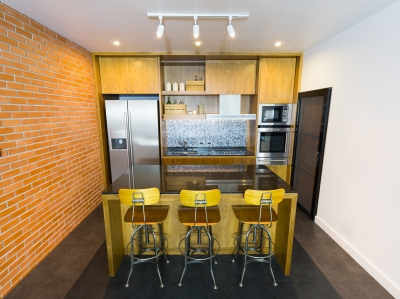Popular Natural Choices for Countertop Material


When it comes to countertop choices for homes today, three of the most widely sought after materials, are born of the earth. These are granite, marble, and quartz. All three have made their way into homes the world over, covering counters in bathroom, kitchens, and laundry rooms, as well as flooring, and even wall and shower tiles.
Below is a brief description of each:
Granite – Granite slabs are mined all over the globe, from the United States, Europe, Asia, and the Middle East. Many consider granite to be the pinnacle of countertop materials, unmatched by any other material for its natural beauty, exuding elegance and class. Every slab of granite mined is as unique as the area that formed it, with no two identical. Granite exists in hundreds of colors, veining, and patterns. Some are neutral and primarily solid such as white, creams, or beige with very little veining. Other colors like reds, pinks, black, green, or brown, exist with heavy veining or patterns. In kitchens, granite countertops are prized for their high resistance to cuts and scratches and heat from cookware. Since granite is a porous material, it will readily absorb oil and is easily stained by acidic liquids. To prevent this, granite must be properly sealed to provide moisture, acid, and scratch-resistance.

Marble – Like granite, marble countertops are highly desired due to their inherent elegance as well. Marble is also available in a vast array of colors with veining or marbling, with no two sections alike. Colors range from solid black or white or a combination of, to grays, reds, yellows and greens. Although marble can withstand direct placement of hot cookware, most manufacturers will not recommend using marble in kitchens. The concern is twofold: porosity and its fragile nature. Marble is highly porous and is easily stained if not sealed properly. Marble is readily chipped or broken if hit with a heavy object and easily cut by a knife. If one insists on marble counters, incorporating them into bathrooms, offices, and even fireplace hearths or surrounds, are good alternatives.
Quartz – There are some quartz countertops derived from whole slabs of quarried quartz but these are not the norm. The majority are man-made by a process that mixes roughly 95 percent ground quartz with a polymer resin binding agent. Quartz is an incredibly strong, natural-looking surface, available in a head-spinning variety of colors – its biggest attraction. Quartz material countertops are nearly indestructible, which is the reason many manufacturers provide a warranty, something unheard of with granite or marble. Since quartz is non-porous it is resistant to staining and can be maintained bacteria free up to 99.9 percent.
Whether one chooses marble, quartz, or granite countertops, they all have their strengths and weaknesses. Every homeowner needs to research before deciding on a material for their countertops. This is extremely important for stone countertops, as these are at the high end of the price spectrum, and once it's installed it's likely to stay that way for many years.